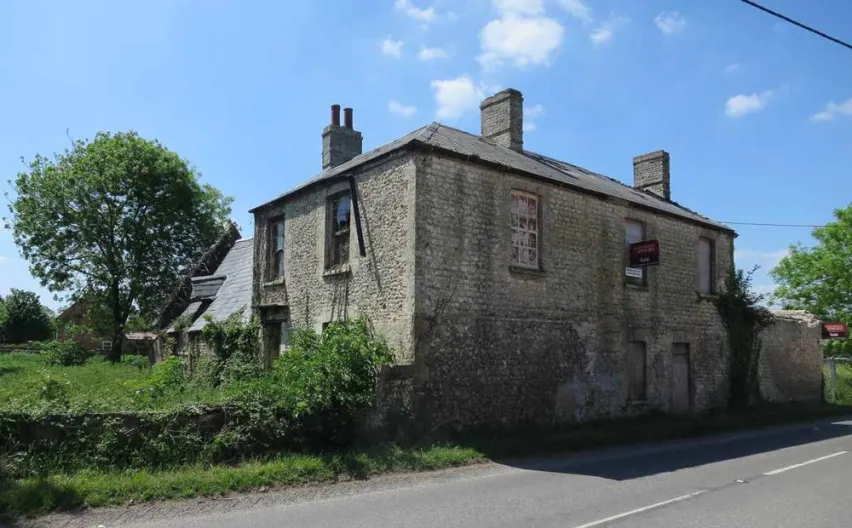Buying a derelict property at auction might not sound glamorous at first — but for investors, developers, and even adventurous first-time buyers, these “fixer-upper” opportunities are often the most exciting lots in the catalogue.
Walk into any UK property auction, and you’ll notice a recurring theme — derelict properties attracting eager bids from both seasoned investors and ambitious first-time buyers. While some see crumbling walls and overgrown gardens, others see potential, profit, and opportunity.
But why do these run-down homes, barns, and commercial buildings spark such intense interest at auction? The answer lies in the unique advantages they offer — from competitive pricing and redevelopment potential to the thrill of transforming something neglected into something spectacular.
In this article, we’ll explore exactly why derelict properties are such popular lots at auction sales, the types of buyers they attract, and what you need to know before raising your hand in the bidding room.

UK Auction List serves as a comprehensive directory for auction properties across the UK. It connects buyers with a wide range of listings from various auctioneers. UK Auction List is a directory and a promotional platform only. It does not offer legal advice, or participate directly in the auction process.
1. Lower Entry Costs
One of the biggest draws of a derelict property is its price tag.
In many cases, derelict buildings are priced significantly lower than move-in-ready homes because of their condition. Auction reserve prices can start well below market value, opening the door for buyers to purchase in prime locations they might otherwise be priced out of.
For investors, this low entry point means greater potential for profit once renovations are complete. For homebuyers, it can be the only affordable way to secure a property in a desirable area.
2. High Potential for Value Growth
When a property is in poor condition, improvements can create dramatic increases in value. Buyers with renovation skills or access to reliable contractors can transform a derelict building into a high-demand home or commercial space. Example: A disused rural cottage bought at auction for £80,000 could be worth double — or more — once restored. Check out how to spot properties everyone else will avoid.
3. Variety of Uses
Derelict properties aren’t just for residential buyers — they appeal to a wide range of audiences:
- Investors looking to resell for profit.
- Landlords wanting to add rental units.
- Developers seeking to convert into flats or commercial spaces.
- Self-build enthusiasts chasing their dream home project.
4. Less Competition from Traditional Buyers
Many standard buyers shy away from properties that need major work, so auction bidders may face less competition for derelict lots compared to ready-to-move-in homes. This can lead to more favourable purchase prices — especially if you’re prepared and confident in the bidding process.
5. Planning Permission Potential
A derelict property may come with scope for redevelopment, extensions, or change of use — subject to planning permission. For strategic buyers, this adds another layer of potential profit.
Pro Tip: Always check local planning records before bidding to ensure your intended project is feasible.
6. Rural and Unique Locations
Derelict properties often appear in locations where ready-built homes are rare — such as remote countryside plots, historic buildings, or areas with stunning views. For some buyers, the location alone makes the renovation worth it.
7. Speed of Purchase
Like all auction sales, derelict property transactions are quick — with completion usually within 28 days. This speed appeals to buyers wanting to move fast and avoid lengthy estate agent negotiations.
Tips for Buying a Derelict Property at Auction
If you’re tempted by the possibilities, keep these pointers in mind:
- View the property in person to assess the scale of renovation needed.
- Review the legal pack carefully — look for restrictive covenants, planning issues, or rights of way.
- Budget for the unexpected — renovation costs often exceed initial estimates.
- Secure appropriate finance before auction day, as completion deadlines are tight (usually 28 days).
FAQs on Buying Derelict Properties at Auction
Is buying a derelict property risky?
It can be if you don’t do your due diligence. Always inspect the property, check the legal pack, and get a survey before bidding.
Can I get a mortgage for a derelict property?
Most high street lenders won’t offer mortgages on uninhabitable properties. Many buyers use cash or bridging finance, then refinance later.
Do derelict properties always sell cheap?
Not always — high demand or a prime location can push prices up. However, they often offer better value than fully refurbished homes in the same area.
Final Thoughts
Derelict properties at auction may not be everyone’s cup of tea, but for those with vision, determination, and a realistic budget, they can be a golden opportunity. Whether your goal is to flip for profit, create a dream home, or preserve a piece of history, the popularity of these lots shows that in property auctions, one person’s eyesore is another’s dream project. For more information on buying property at auction, have a peruse of our UK Auction List buying guide.
Want to Sell a Derelict Property?
If you own a derelict or unmodernised property and would like to sell it at auction, UK Auction List can help. We work with a wide network of auctioneers across the UK to get your property in front of the right buyers. Simply complete a few details for your free, no obligation auction appraisal.
Learn more about selling your property at auction in our helpful guide.